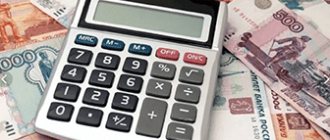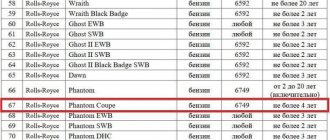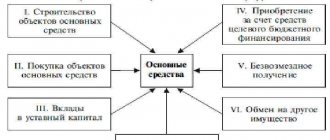when determining the types of motor vehicles and classifying them as trucks or cars, you must be guided by the data of the vehicle passport (PTS). The type and category of the vehicle are indicated in lines 3 and 4 of the PTS. Based on this, it is necessary to determine the transport tax rate. If the electric forklift is registered with the traffic police department, then a rate of 15 rubles is applied to it - trucks with an engine power (per horsepower) of up to 100 hp. With. (up to 73.55 kW) inclusive. If it is registered with the Gostekhnadzor authorities with the issuance of a passport for a self-propelled vehicle, then the tax rate is 25 rubles - other self-propelled vehicles, pneumatic and tracked machines and mechanisms (for each horsepower).
The rationale for this position is given below in the materials of the Glavbukh System
Vehicle categories
The size of the transport tax rate depends on the category of the vehicle and its technical characteristics (power, traction, capacity) (Article 361 of the Tax Code of the Russian Federation).
Categories of vehicles are listed in Article 361 of the Tax Code of the Russian Federation. These include, for example:*
- cars;
- motorcycles and scooters;
- buses;
- trucks;
- other self-propelled machines and mechanisms on pneumatic and caterpillar tracks;
- boats, motor boats and other water vehicles;
- yachts and other sailing-motor vessels;
- jet skis;
- airplanes, helicopters;
- non-self-propelled (towed) vessels, etc.
A vehicle type code for a forklift that has long been considered controversial
Discussions about what code should be assigned to a forklift continued for several years. According to the latest opinion, which is taken into account when filling out the declaration, a forklift can be classified as other vehicles with code 590 00. This is justified by the fact that forklifts are not vehicles that are grouped into a separate subsection “Vehicles” (code 15 0000000) in OKOF codes. In the OKO 013-94B directory, they are included in the subsection “Machinery and Equipment” (code 14 0000000) OKOF under code 14 2915540. Therefore, as the vehicle type code for tax purposes for a forklift, you can select code 590 00 “Other vehicles”. There is still no official position of officials on this issue.
Category Definition
When determining the types of motor vehicles and classifying them as trucks or cars, you must be guided by the data of the vehicle passport (PTS).* This procedure is confirmed by letters of the Ministry of Finance of Russia dated August 13, 2012 No. 03-05-06-04/137 and dated 21 October 2010 No. 03-05-06-04/251, Federal Tax Service of Russia dated February 15, 2012 No. BS-4-11/2450 and dated December 1, 2009 No. 3-3-06/1769.
The type and category of the vehicle are indicated in the lines and PTS* on the basis of the Convention on Road Traffic (Vienna, November 8, 1968), ratified by Decree of the Presidium of the Supreme Soviet of the USSR dated April 29, 1974 No. 5938-VIII (Regulations approved by a joint order dated June 23, 2005 Ministry of Internal Affairs of Russia No. 496, Ministry of Industry and Energy of Russia No. 192, Ministry of Economic Development of Russia No. 134).
Vehicle types refer to the characteristics of a vehicle, determined by its design features and purpose (truck, passenger car, bus, etc.). Five categories of vehicles can be distinguished: * 1) A – motorcycles, scooters and other motor vehicles; 2) B – cars whose permissible maximum weight does not exceed 3500 kg and the number of seats, in addition to the driver’s seat, does not exceed eight; 3) C – cars, with the exception of those belonging to category “D”, the permissible maximum weight of which exceeds 3500 kg; 4) D – vehicles intended for the transport of passengers and having more than 8 seats in addition to the driver’s seat; 5) E – trailer – a vehicle intended to be driven in conjunction with a vehicle. This term includes semi-trailers.
If the data on the category (type) of the vehicle specified in the PTS does not allow one to unambiguously determine the tax rate, then this issue should be resolved in favor of the organization* (letter of the Federal Tax Service of Russia dated December 1, 2009 No. 3-3-06/1769).
Sergey Razgulin
,
Actual State Councilor of the Russian Federation, 3rd class
In accordance with the Decree of the Government of the Russian Federation dated August 12, 1994 No. 938, the state registration authorities for land vehicles are:*
1. Traffic police departments - in relation to motor vehicles with a maximum design speed of more than 50 km/h, and trailers for them, intended for driving on public roads. 2. Gostekhnadzor bodies - in relation to tractors, self-propelled road-building machines and other machines and trailers for them, including motor vehicles with a maximum design speed of 50 km/h or less, and also not intended for driving on public roads.
Thus, only in relation to vehicles registered with the state supervision authorities over the technical condition of self-propelled vehicles and other types of equipment in the Russian Federation, for which passports of self-propelled vehicles have been issued, when calculating transport tax, the tax rate established for the category “other self-propelled vehicles” should be applied. vehicles, machines and mechanisms on pneumatic and tracked tracks.”*
L.P. Kurochkina, chief state tax
Inspector of the tax department for individuals
persons of the Federal Tax Service of Russia in St. Petersburg
Ambiguity of wording is a common problem in our legislation. And everything would be fine if we weren’t talking about such an important matter as paying taxes. If you read one article of the Tax Code of the Russian Federation incorrectly, you will be told about tax evasion before you can blink an eye. Or, for example, transport tax.
If you have a car, bus or truck on your balance sheet, and there’s nothing to think about, you submit a declaration and that’s it. But if something is more interesting, for example, an excavator, the transport tax is no longer clear how to calculate it. Where does it belong to trucks or other self-propelled vehicles?
Of course, we cannot change the legislation. But shedding light on the “mystery” of the excavator is quite possible. Listen and remember...
Electric forklift transport tax for 2020 for legal entities
Important
The company's accountant will multiply the tax amount by this number for the final calculation.
Calculation of transport tax 2020 for legal entities (example)
Let's look at the calculation using real examples.
Example 1. Calculation using an advance payment system
Since 2020, the registration documents of the St. Petersburg company have listed a passenger car with a power of 170 l/s. The car was new when purchased. The cost of transport is less than 1 million rubles.
Let's do the tax calculation.
- Before substituting the formula, let’s look at the table above and find the tariff we need. For our capacity in St. Petersburg, the rate is set at 50 rubles.
What is an excavator and who “needs” it?
To understand how to charge transport tax on an excavator, you need to very clearly understand what it is and what type of vehicle it can be classified as.
An excavator is an earth-moving machine equipped with a bucket and used for construction and agricultural purposes. According to the All-Russian Classification of Fixed Assets, excavators belong to section No. 14 2924020 “Other self-propelled machines and equipment.”
Excavators, including wheeled ones, are not intended for use on public roads and are subject to mandatory registration with the state supervision authorities for the technical condition of self-propelled vehicles and other types of equipment in the Russian Federation or, more simply, with Rostekhnadzor (based on the Decree of the Government of the Russian Federation No. 938 of August 12 .94). Please note: the traffic police authorities have nothing to do with the registration of excavators.
Why do we need information about where excavators are registered? The fact is that it is the body that registered the self-propelled vehicle that will subsequently be responsible for submitting information to the Federal Tax Service to control the payment of taxes.
Well, what to do if you have not yet registered an excavator for yourself or your company? Are there legal ways not to register a vehicle and not pay transport tax at all?
Even if you do not plan to use a backhoe loader and you will not drive it on the roads, you are still required to register it. Otherwise, your actions may be classified as tax evasion.
According to Order of the Ministry of Agriculture and Food of the Russian Federation No. 785 of January 27, 1996, self-propelled vehicles must be registered during the validity of transit license plates or within 5 days from the moment of customs clearance, deregistration or other event as a result of which the owner of the self-propelled vehicle changes.
Judicial practice regarding unregistered vehicles is harsh. So, according to the Resolution of the Federal Antimonopoly Service of the Moscow District No. KA-A40/5199-08-2 dated August 20, 2008, “the absence of registration of a vehicle does not exempt the applicant from paying transport tax.” The only exception can be made for enterprises that manufacture excavators and organizations that sell these vehicles under license.
Responsibility
Even if the car is not used and does not drive on public roads, it must still be registered with Rostekhnadzor and the fee required by law must be paid. Otherwise, inaction will be regarded as deliberate evasion of payment of the transport fee.
To make the calculations correctly, you need to contact the nearest vehicle registration authority or tax service to clarify the current rates in the city or region.
Video: All about transport tax
Publications on the topic
Factors for classifying types of excavators
List of offers for renting a backhoe loader in Makhachkala
Application and operating principle of walking excavators
Excavator as an object of taxation
We found out that Rostechnadzor is responsible for registering excavators. But what does this mean for the calculation and payment of transport tax? Which group should excavators be classified into: trucks or other self-propelled vehicles?
The Letter of the Department of Tax and Customs Tariff Policy of the Ministry of Finance of the Russian Federation No. 03-06-04-04/21 dated May 31, 2006 will help you in resolving this issue. In accordance with it, vehicles for which PSM has been received from Rostechnadzor are subject to tax rates , defined for the category “other self-propelled vehicles”. Consequently, excavators registered with Rostechnadzor, as an object of transport tax, will be subject to a fee at the rate determined for “other self-propelled vehicles.”
advocatus54.ru
Credit 44.01 – 322 354 = Driver’s license.
Sochi as a mountain climatic resort.
As for electric forklifts: they are not supervised by Gostekhnadzor and you do not need to obtain a license for them. But they often require an electric forklift driver’s license, which indicates the type of machine on which he can work: forklift driver (battery-powered), electric pallet truck driver, etc. Loaders with an internal combustion engine (“forklifts”) are supervised by Gostekhnadzor and those working on them must have a “Tractor Driver’s Certificate (tractor operator)”, i.e.
Rights to drive self-propelled vehicles.
The self-propelled machines themselves (including loaders) are divided into categories in accordance with
“Rules for admission to driving self-propelled machines and issuing tractor driver (tractor driver) licenses”
(Approved by the Decree of the Government of the Russian Federation of July 12, 1999. Reports _ regulated _ transport
Transport tax in the regions
According to Art. 361 of the Tax Code of the Russian Federation, the base rate for this category is set at 2.5 rubles. with one hp However, the Tax Code enshrines the right of regions to increase the base rate by up to 10 times.
Let us now tell you how the subjects disposed of their rights.
- In Moscow, you will have to pay 25 rubles for each horsepower of an excavator. (MSK law No. 33 of 07/09/08). In this case, organizations are required to pay tax to the budget in full (advance payments have been abolished since 2015) before February 5 of the year following the reporting year.
- The same rate (25 rubles/hp) is established in St. Petersburg (law No. 487-53 of November 4, 2002), Moscow (law No. 129/2002-OZ of November 16, 2002), Leningrad ( law No. 51-OZ of November 22, 2002) and the Nizhny Novgorod regions (regional law No. 71-Z of November 28, 2002).
- In the Krasnoyarsk Territory - for every hp. excavator capacity will be charged 11.5 rubles. tax In Saratov, horsepower costs 21 rubles. In Sverdlovsk - 16 rubles, in Omsk - 12 rubles, in Bashkortostan - 20 rubles.
- The lowest vehicle tax rate is in the third city of federal significance - Sevastopol. Let us remind you that in the current year 2020, Crimean taxpayers will pay transport tax for the first time. The rate for excavators here is 5 rubles/hp. (city law No. 75-ZS dated November 14, 2014). By the way, this record low rate is the same for the entire Republic of Crimea (Law No. 8-ZRK/2014 of November 19, 2014).
Please note: in some regions, organizations have transport tax benefits. For example, in St. Petersburg, organizations registered in a special economic zone are exempt from paying taxes on excavators and other vehicles for 5 years.
If a taxpayer enterprise has the right to preferential payment of tax, it must submit documents confirming this right within the period established by law (as a rule, this must be done before the end of the tax period). Those who do not have time to submit documents will not be able to take advantage of the benefit until the next tax period.
The benefit is provided for a period not exceeding the validity period of the title documents, including indefinitely.
A construction company has purchased a forklift that is used only on the construction site. Its engine power is 60 hp. s., maximum speed - 19 km/h. Does it need to be registered? And what threatens a company if it puts a forklift into operation without any registration? Is it necessary to pay transport tax?
Calculation of tax amount in 2020
The tax period is actually recognized as a whole calendar year if the ownership of the vehicle was continuous. If the owner remained in this status in relation to the object of taxation not for the entire period, but, say, only for a few months, for example, the transport was not registered from the beginning of the calendar year or was deregistered before the end of the calendar year, then the tax is paid in proportion to the time of ownership and use of the transport . Moreover, if the deletion or registration took place not on the 1st day, but later, this month is included in its entirety when calculating the size of the technical tax. The standard formula is used for calculation:
TN = NB x NS x (KMV / 12), where:
- TN - transport tax;
- NB - tax base;
- NS - tax rate;
- KMV - the number of months of car ownership per calendar year.
The tax base depends on engine size. At the federal level, all vehicles are graded. There are several categories: up to 100 hp, from 100 to 150 hp. etc. Due to the fact that an advance payment is required, which is a quarter of the total tax payable, at the time of the reporting tax period, the amount of tax minus the amount of the advance payment is billed. Advance payments are collected only from business entities; ordinary citizens pay the TN in full during the reporting period.
Answer
The company needs to register the forklift and pay transport tax on it. State registration of motor vehicles and other types of self-propelled equipment is carried out in the manner established by Decree of the Government of the Russian Federation of August 12, 1994 No. 938. Forklifts are also subject to registration (but not with the traffic police, but with the state technical supervision authorities, since they usually do not drive on the roads for general use) if they have an engine displacement of more than 50 cubic meters. see (clause 2 of RF Government Decree No. 938). Thus, registered forklifts must pay transport tax. Since the forklift is operated only on the construction site and does not drive on public roads, in order to save on transport tax, the organization may decide not to register it with the state technical supervision authorities. At the same time, you need to keep in mind that if the state technical supervision inspector does not come to check the organization, then it will be able to avoid paying transport tax. And if an inspection does happen, the organization will be required to register the forklift with the state technical supervision authority. At the same time, for failure to register forklifts, a fine in the amount of 1,000 to 3,000 rubles may be imposed on the organization, and on officials - in the amount of 100 to 300 rubles. (Article 19.22 of the Code of Administrative Offenses of the Russian Federation). But the organization’s obligation to pay transport tax in this case will still arise only after registering the forklift with the state technical supervision authority. The forklift tax is paid on each horsepower at the rate established for the category “other self-propelled vehicles, pneumatic and tracked machines and mechanisms.”
“Trade: accounting and taxation”, 2012, N 3
The use of electric, gasoline, and diesel forklifts in the business activities of a trading organization is commonplace. Is it necessary to pay transport tax in relation to these vehicles?
Let's start studying this issue with the norms of the Tax Code: according to Art. 357 transport tax payers are persons who, in accordance with the legislation of the Russian Federation, are registered with vehicles recognized as an object of taxation. An exception is the organizers of the XXII Olympic Winter Games and the XI Paralympic Winter Games 2014 in Sochi, marketing partners of the International Olympic Committee in relation to vehicles owned by them and used exclusively in connection with the organization and (or) holding of the Olympic (Paralympic) ) games and the development of Sochi as a mountain climatic resort.
In paragraph 1 of Art. 358 of the Tax Code of the Russian Federation lists vehicles as objects of taxation. These include:
- cars, motorcycles, scooters, buses and other self-propelled machines and mechanisms on pneumatic and caterpillar tracks;
- airplanes, helicopters;
- motor ships, yachts, sailing ships, boats;
- snowmobiles, motor sleighs;
- motor boats, jet skis, non-self-propelled (towed vessels) and other water and air vehicles registered in the prescribed manner in accordance with the legislation of the Russian Federation.
Below (in paragraph 2) are vehicles that are not subject to transport tax, these are:
- rowing boats, as well as motor boats with an engine power not exceeding 5 hp. With.;
- passenger cars specially equipped for use by disabled people, as well as passenger cars with an engine power of up to 100 hp. With. (up to 73.55 kW), received (purchased) through social protection authorities;
- fishing sea and river vessels;
- passenger and cargo sea, river and aircraft owned (by the right of economic management or operational management) of organizations and individual entrepreneurs whose main activity is passenger and (or) cargo transportation;
- tractors, self-propelled combines of all brands, special vehicles (milk tankers, livestock trucks, machines for transporting and applying mineral fertilizers, etc.), registered to agricultural producers and used in agricultural work for the production of agricultural products;
- vehicles owned by the right of operational management to federal executive authorities, where military and (or) equivalent service is legally provided for;
- vehicles that are wanted, subject to confirmation of the fact of their theft (theft) by a document issued by an authorized body;
- airplanes and helicopters of air ambulance and medical services;
- ships registered in the Russian International Register of Ships.
As you can see, auto- and electric forklifts are not included among the exceptions. Therefore, we need to find out:
- whether the specified vehicles must be registered by their owner in accordance with the legally established procedure;
- what exactly is this order;
- Which authorities are responsible for vehicle registration?
State registration of motor vehicles and other types of self-propelled equipment is carried out in the manner established by Decree of the Government of the Russian Federation of August 12, 1994 N 938 “On state registration of motor vehicles and other types of self-propelled equipment on the territory of the Russian Federation” (hereinafter referred to as Resolution N 938). In accordance with paragraph 2 of the said Resolution, registration of vehicles on the territory of the Russian Federation is carried out by:
- divisions of the State Road Safety Inspectorate of the Ministry of Internal Affairs of the Russian Federation in relation to motor vehicles with a maximum design speed of more than 50 km/h, and trailers for them, intended for driving on public roads;
- bodies of state supervision over the technical condition of self-propelled machines and other types of equipment in the Russian Federation - tractors, self-propelled road-building and other machines and trailers for them, including motor vehicles with a maximum design speed of 50 km/h or less, as well as those not intended for movement on public roads
; - military automobile inspections of federal executive authorities, which provide for military service, and other organizations with military formations - vehicles of military formations of federal executive authorities and other organizations.
Clause 1 of Resolution No. 938 explains that vehicles with an internal combustion engine displacement of more than 50 cubic meters are subject to registration. cm or a maximum electric motor power of more than 4 kW.
So, we found out that if a vehicle is not operated on public roads, but its technical characteristics exceed the established minimum (has an internal combustion engine capacity of more than 50 cc or a maximum electric motor power of more than 4 kW), it must be registered in the bodies of Gostekhnadzor. Moreover, this must be done within 5 days after the acquisition of such a vehicle (customs clearance, deregistration, replacement of license plate units or the occurrence of other circumstances requiring a change in registration data) (clause 3 of Resolution No. 938). The rules for state registration of vehicles of interest to us were approved by the Ministry of Agriculture and Food on January 16, 1995.
For your information. Legal entities and individual entrepreneurs who trade in vehicles in the manner prescribed by the legislation of the Russian Federation do not register vehicles intended for sale (clause 3 of Resolution No. 938).
From the above, we conclude that the owners of forklifts register them with the Gostekhnadzor authorities, and registration is an obligation, not a right of the organization. Accordingly, forklifts registered in the prescribed manner, for which self-propelled vehicle passports have been issued, are subject to transport tax. A similar opinion was expressed in Letters of the Ministry of Finance of Russia dated 08/25/2009 N 03-05-05-04/09, dated 08/17/2007 N 03-05-06-04/35, UMNS for Moscow dated 06/07/2004 N 23-10 /3/37665.
By the way, Art. 19.22 of the Code of Administrative Offenses of the Russian Federation establishes liability for violation of the rules of state registration of vehicles of all types (if such registration is mandatory), in particular for officials the fine ranges from 100 to 300 rubles, for legal entities - from 1000 to 3000 rubles.
But, as practice shows, forklift owners do not always conscientiously fulfill the obligation to register said vehicles and, accordingly, evade paying transport tax, arguing that the forklifts are not operated outside the enterprise.
Let's look at court decisions on this issue.
For example
, Resolution of the Federal Antimonopoly Service of the Moscow Region dated April 16, 2009 N KA-A40/2929-09. During the control activities, the tax inspectorate established that in the period from January 2002 to June 2006, the organization purchased forklifts, but until October 2006 they were not registered in the prescribed manner and transport tax was not paid on them. The court came to the following conclusions:
- the obligation to pay tax cannot be made dependent on the desire of the person to register the objects of taxation belonging to him;
- Art. 358 of the Tax Code of the Russian Federation does not provide for a relationship between the facts of using vehicles and the calculation of transport tax.
Verdict: as a result of using vehicles without proper registration, the company unjustifiably received a tax benefit in the form of non-payment of transport tax.
The Moscow Arbitration Court came to a similar conclusion (Decision dated August 21, 2009 N A40-12160/08-114-50): since vehicles were subject to registration with Gostekhnadzor, they are recognized as subject to transport tax.
To be fair, we note that there are examples of opposite court decisions (see, for example, Resolution of the Federal Antimonopoly Service of the Eastern Military District dated January 15, 2007 N A39-5076/2005-380/11). The company did not include 57 units of vehicles in the transport tax base (motor grader, grader, scraper, tractor, asphalt paver, roller, motor roller, vibratory roller, road roller, bulldozer, loader, excavator). The basis for additional tax assessment was the information (certificate) provided by Gostekhnadzor. However, having examined the said certificate, the court found that in the presented list of vehicles registered with the taxpayer, the state registration marks of the vehicles were not indicated, and therefore it was not possible to identify them. According to the judges, the document confirming the registration of a vehicle by the Gostekhnadzor authorities is a registration certificate and a state registration plate. Under such circumstances, the court considered that the company included in the taxable base for transport tax all vehicles that had undergone state registration in the manner prescribed by law. In essence, the court’s position is: no registration - no tax.
General audit department on the issue of payment of transport tax from a forklift
Question The OJSC purchased electric wheeled loaders under leasing agreements, engine power 9 KW #40; 12.2 horsepower #41;, superelastic tire type. Electric forklifts are on our balance sheet. Electric forklifts have passed state registration, and “passports for self-propelled vehicles and other types of equipment” have been obtained. We ask you to express your opinion on the issue of the need to pay transport tax for these electric forklifts.
In accordance with Article 357 of the Tax Code of the Russian Federation, taxpayers of transport tax are persons on whom, in accordance with the legislation of the Russian Federation, vehicles are registered that are recognized as an object of taxation in accordance with Article 358 of this Code, unless otherwise provided by this article.
Thus, an organization is recognized as a transport tax payer in relation to a vehicle if two conditions are met simultaneously
:
— the vehicle is registered to the organization;
- the vehicle is subject to taxation.
First of all, let’s consider whether an electric forklift is subject to transport tax.
According to paragraph 1 of Article 358 of the Tax Code of the Russian Federation, the objects of taxation are cars, motorcycles, scooters, buses and other self-propelled machines and mechanisms on pneumatic and caterpillar tracks, airplanes, helicopters, motor ships, yachts, sailing ships, boats, snowmobiles, motor sleighs, motor boats, jet skis , non-self-propelled (towed vessels) and other water and air vehicles registered in the prescribed manner in accordance with the legislation of the Russian Federation.
Paragraph 2 of Article 358 of the Tax Code of the Russian Federation lists vehicles that are not recognized as an object of taxation. Electric forklifts are not named in this list; accordingly, the vehicles in question may be considered an object of taxation if they are subject to state registration.
The procedure for registering vehicles is established by Decree of the Government of the Russian Federation dated August 12, 1994 No. 938 On the state registration of motor vehicles and other types of self-propelled equipment on the territory of the Russian Federation.
In accordance with paragraph 2 of this resolution, registration of vehicles on the territory of the Russian Federation is carried out by:
— divisions of the State Road Safety Inspectorate of the Ministry of Internal Affairs of the Russian Federation in relation to motor vehicles with a maximum design speed of more than 50 km/h, and trailers for them, intended for driving on public roads;
- state supervision bodies over the technical condition of self-propelled machines and other types of equipment in the Russian Federation - tractors, self-propelled road-building and other machines and trailers for them, including motor vehicles with a maximum design speed of 50 km/h or less, and also not intended for traffic on public roads.
At the same time, as follows from paragraph 1 of Resolution No. 938, vehicles with a working volume of an internal combustion engine of more than 50 cubic meters are subject to registration. cm or maximum electric motor power of more than 4 kW
.
In the case under consideration, we are talking about electric forklifts that are not intended for driving on public roads and have an engine capacity of over 4 kW, namely 8 and 9 kW
.
Accordingly, such loaders are subject to state registration
.
Thus, taking into account the above, since electric forklifts are subject to registration, they, in accordance with paragraph 1 of Article 358 of the Tax Code of the Russian Federation, are recognized as an object of taxation
.
As stated above, in order for an organization to be recognized as a payer of transport tax in relation to a certain vehicle, this vehicle must not only be recognized as an object of taxation, but also be registered in the name of this organization.
According to the information set out in the question, the electric forklifts were received under a leasing agreement, according to the terms of which the Organization accounts for them on its balance sheet.
In accordance with Article 20 of the Federal Law of October 29, 1998 No. 164-FZ “On Financial Lease (Leasing),” leased items subject to registration with government agencies (vehicles, high-risk equipment and other leased items) are registered by agreement of the parties in the name lessor or lessee.
Thus, a self-propelled vehicle can be registered by agreement of the parties to both the lessor and the lessee.
Taking into account the above, the payer of transport tax can be the lessor or the lessee, depending on who the vehicle is registered to.
The submitted passports for self-propelled vehicles do not contain information about who the electric forklifts are registered to. In this regard, we cannot determine whether your organization is a transport tax payer
. If the leasing agreement provides for the registration of electric forklifts for your organization, then accordingly, your organization will be recognized as a tax payer.
Please note that according to paragraph 3 of Decree No. 938, vehicles must be registered with the state technical supervision authorities within 10 days after purchase.
Violation of the rules of state registration of vehicles of all types (with the exception of sea vessels and mixed (river-sea) navigation vessels), mechanisms and installations, if registration is mandatory, entails the imposition of an administrative fine on officials - from 2000 to 3500 rubles; for legal entities - from 5,000 to 10,000 rubles (Article 19.22 of the Code of Administrative Offenses of the Russian Federation).
buhgalter-sha.ru
There is a forklift on the balance sheet: do I need to pay transport tax?
The use of electric, gasoline, and diesel forklifts in the business activities of a trading organization is commonplace. Is it necessary to pay transport tax in relation to these vehicles?
Let's start studying this issue with the norms of the Tax Code: according to Art. 357 transport tax payers are persons who, in accordance with the legislation of the Russian Federation, are registered with vehicles recognized as an object of taxation.
Electric forklift transport tax for 2020 for legal entities rates
Is it possible to return a swimsuit to the store if it doesn’t fit?
Statement p14001 when changing okved sample
If the item is torn they want to return it back
Subsidies for agriculture
Orders on vehicle staffing schedules
Payments upon reaching 90 years of age
The full month is taken to be the month in which the vehicle was purchased before the 15th or was disposed of after the 15th (clause 3 of Article 362 of the Tax Code of the Russian Federation).
- Rules have been established that the list of expensive cars is applicable only to the period in which it was posted on the website of the Ministry of Industry and Trade before March 1 (clause 2 of Article 362 of the Tax Code of the Russian Federation), i.e., with a change in this list, the tax for previous years cannot be recalculated need to.
- For transport tax assessed on heavy vehicles, for 2016–2018 we apply a deduction in the amount of payment paid for the corresponding period for damage caused to roads by these vehicles (clause 2 of Article 362 of the Tax Code of the Russian Federation).










